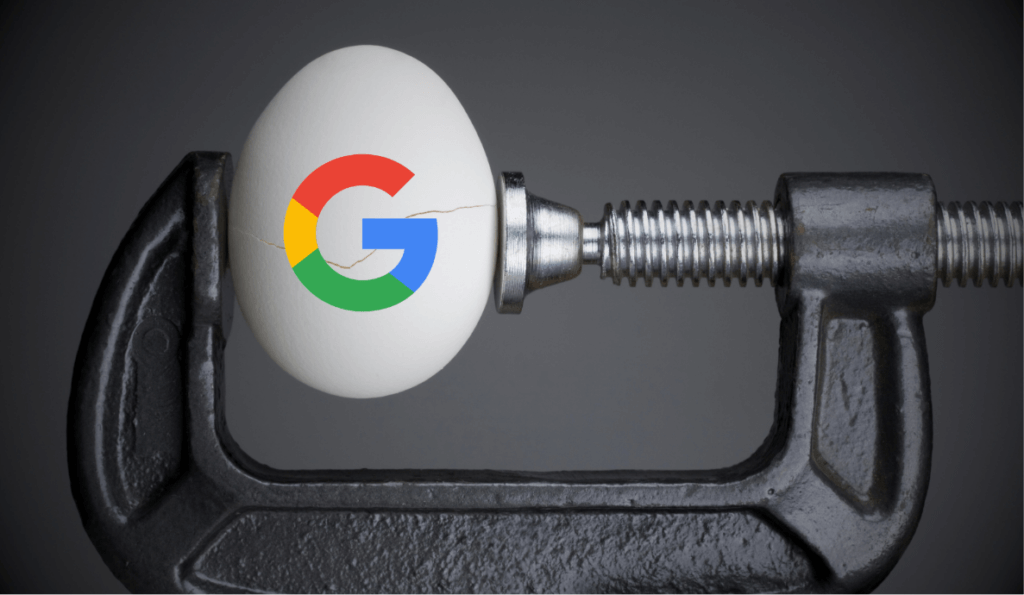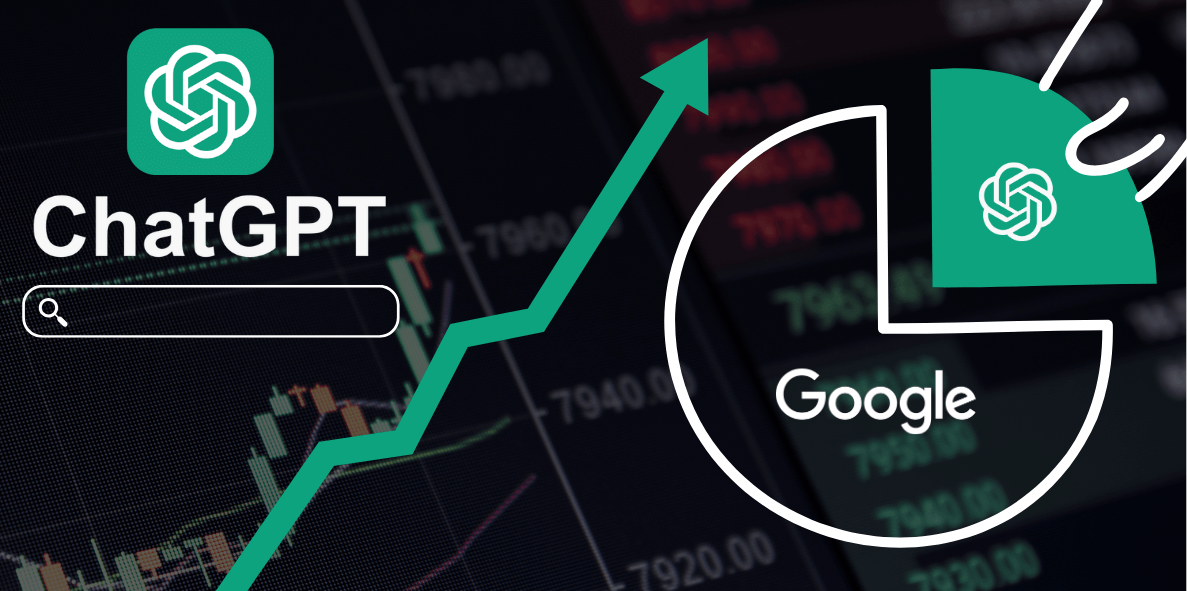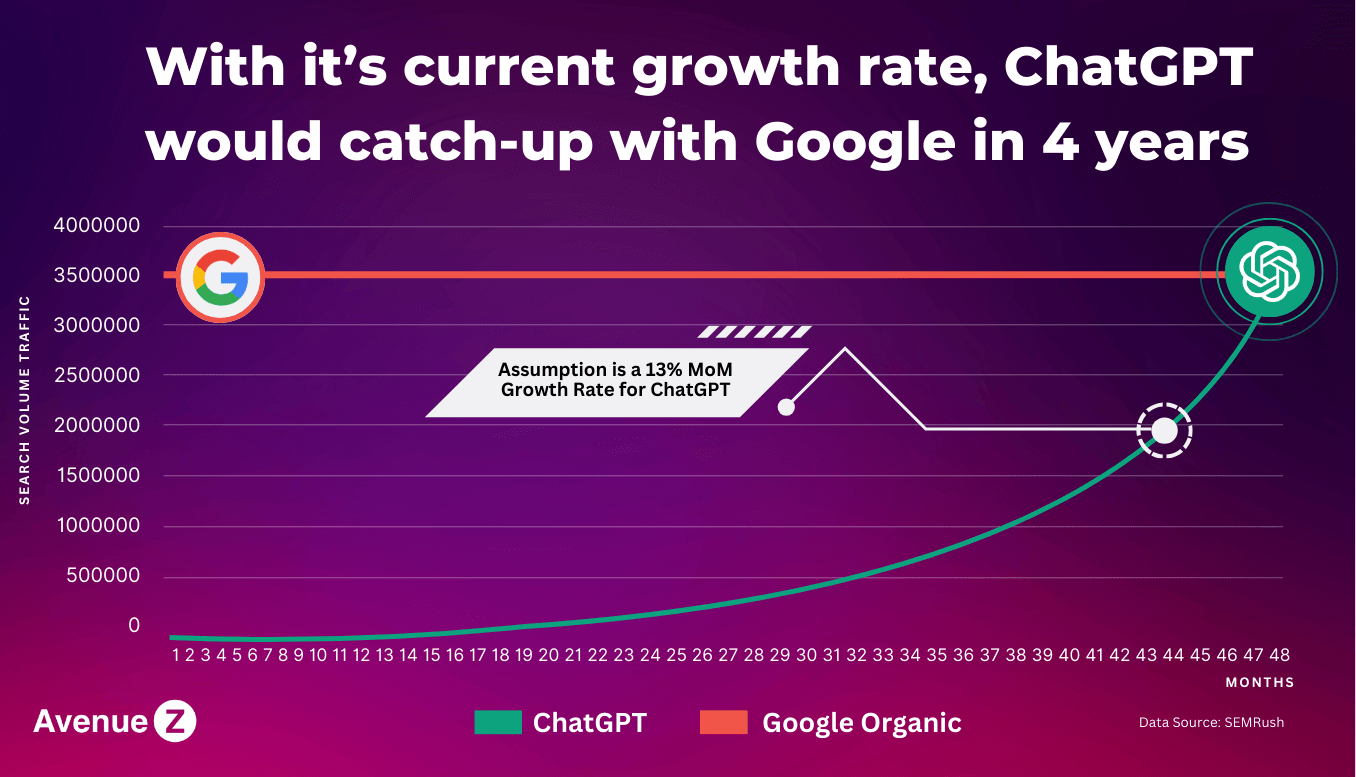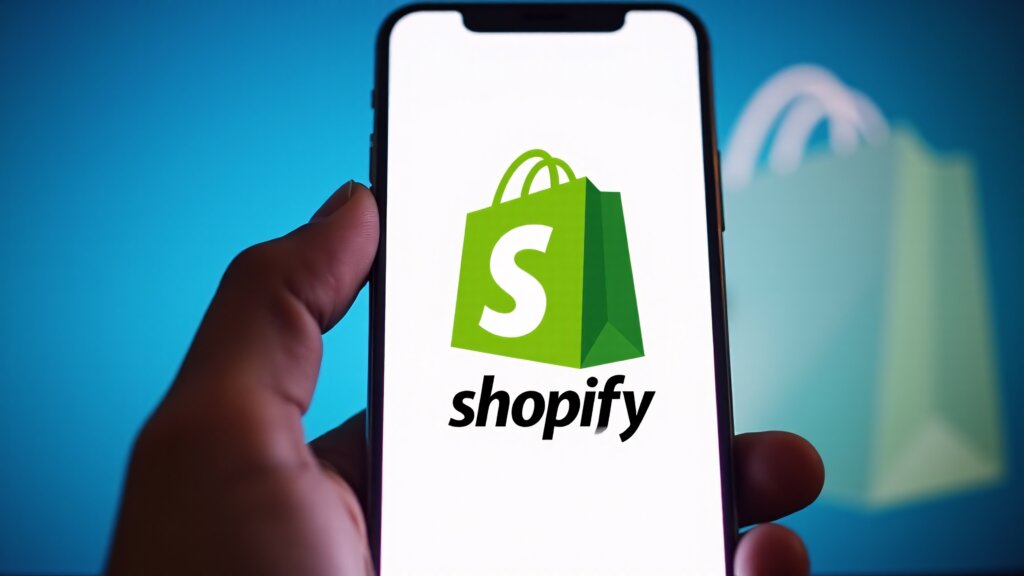The search marketing world has a new contender rewriting the rules of discoverability. For decades, Google set the standard for how consumers searched and how businesses optimized for visibility. But ChatGPT is changing the game at an unprecedented pace.
While Bing, YouTube, Facebook, X, TikTok, and other platforms have attempted to chip away at Google’s dominance, they’ve never achieved significant breakthroughs. ChatGPT, however, is proving different. With its ability to provide conversational, user-focused answers, it’s capturing attention—and search share—like nothing before.
Recent data shows that ChatGPT could rival Google in as little as four years if its current growth trajectory continues.
I hope we have your attention now! This is not the time to be passively watching this new search revolution on the sidelines, it’s time to act.
This Is the Biggest Shift in Search Since the Launch of Google
For two decades, search marketing revolved around Google. The strategies were clear: optimize for keywords, build backlinks, and focus on content to rank in Google’s blue links. That formula worked well—until now.
ChatGPT is dismantling the old model. Instead of providing users with a list of links, it delivers direct, conversational answers, often bypassing the need for users to click through to another site. This creates a fundamentally different search experience—one where the answers themselves, not just the sources, hold the most value.
For consumers, this is a leap forward in convenience. For businesses, it marks a critical moment to rethink how they approach visibility and relevance in the digital space.
The Data Behind the Momentum
Rand Fishkin’s analysis using SimilarWeb and Datos data highlights ChatGPT’s extraordinary progress:
ChatGPT accounts for more searches than Facebook, Twitter, Linkedin, Reddit, Pinterest, and Complexity COMBINED!
- Twice the search share of Bing: While Microsoft’s integration of AI into Bing has garnered attention, ChatGPT’s more intuitive platform is winning over users.
- More share of search than social and niche platforms combined: Platforms like Facebook, Twitter, LinkedIn, Reddit, Pinterest, and Perplexity collectively hold less search share than ChatGPT alone.
- A trajectory that could challenge Google in four years: According to Marcus Tober, ChatGPT’s growth trajectory suggests it may be poised to become a serious competitor to Google in record time.
Here's a projection of what this looks like over the next 4 years pic.twitter.com/f3eeYhk2SQ
— John Dietrich 🚀 (@John_Dietrich1) November 20, 2024
Why This Matters for Marketers
This historic shift in the search landscape requires businesses to reevaluate their strategies now. Here’s why:
- AI Curates Results Differently – Unlike traditional search engines, AI platforms prioritize summarizing content rather than simply displaying it. This means brands need to focus on being included in those summaries to stay visible.
- Search Habits Are Evolving – Consumers are increasingly favoring conversational, intent-driven queries. ChatGPT’s ability to deliver highly contextualized responses directly aligns with this shift.
- Visibility Is Gained or Lost at the AI Level – The role of AI as a gatekeeper means it’s no longer enough to rank high on Google. Brands must position themselves as trusted sources within the AI’s database.
Google’s Feeling The Pressure
While Google still commands the largest share of the search market, ChatGPT’s rise presents its first real challenge in years. Google’s response—launching Bard and preparing Gemini—shows that it recognizes the stakes.
But Google’s ad-driven revenue model makes fully embracing conversational AI tricky. Unlike ChatGPT, which is built for direct answers, Google’s success relies on users clicking links and interacting with ads. This creates a tension that may slow its ability to fully adapt.
Google’s success relies on link clicks, ChatGPT is built for direct answers
If ChatGPT can sustain its current momentum of approximately 13% growth month-over-month, it could rival Google’s search share in just four years. This growth projection highlights the urgency of Google’s response as ChatGPT continues to expand its user base and influence.
Meanwhile, ChatGPT’s lack of legacy constraints allows it to innovate rapidly, capturing users who want fast, precise answers without the clutter of ads. For consumers, this offers a more seamless experience, while for Google, it signals the need for significant adjustments to maintain its dominance.

How to Stay Competitive
If ChatGPT continues to grow, marketers must take proactive steps to secure their brand’s position in this new search era.
- Make Your Content AI-Friendly – Ensure your content is structured and optimized to be featured in AI-generated responses.
- Write concise, easy-to-summarize content tailored for AI.
- Use schema markup to improve visibility in AI indexing.
- Update older content to match AI search trends.
- Focus on Authority and Trust – Establish your brand as a credible, go-to source for AI-driven platforms.
- Build backlinks and earn media coverage to boost authority.
- Showcase certifications, case studies, or awards to build trust.
- Partner with a Top AI SEO agency to increase authority across LLMs
- Adapt for Conversational / Natural Language Queries – Optimize your content to align with how users phrase natural language questions.
- Answer common user questions in conversational tones.
- Use “how-to” guides or listicles to address search intent.
- Incorporate storytelling to make your content more engaging.
- Experiment With Emerging Platforms – Early adoption of AI search platforms helps you understand ranking dynamics before competition intensifies.
- Build your presence on ChatGPT, Perplexity, and other AI tools.
- Create platform-specific content that aligns with their algorithms.
- Test integrations like plugins to improve discoverability.
- Actively Monitor Your AI Share of Voice – Track your visibility on AI platforms to ensure your brand is accurately represented.
- Audit and track your brand mentions and rankings on ChatGPT to ensure you’re included and accurately represented.
- Analyze performance to understand traffic drivers from AI tools.
- Adjust strategies to improve relevance and close visibility gaps.
AI Share of Voice – Track Your Brand Mentions on ChatGPT (Free Tool)
The Search Battle Is Heating Up
For years, search marketing was synonymous with Google. Today, ChatGPT is proving that dominance isn’t guaranteed.
As the recent data shows, ChatGPT’s ability to deliver what users want—quick, personalized answers—sets it apart from competitors. The question isn’t whether ChatGPT will continue to grow—it’s how prepared your brand is to adapt. The search landscape is evolving, and staying competitive means embracing this change now.
The next wave of search marketing isn’t coming. It’s already here.









